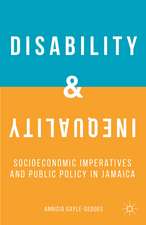Disability and Shopping: Customers, Markets and the State: Routledge Advances in Disability Studies
Autor Ieva Eskytėen Limba Engleză Hardback – 15 ian 2019
Shopping is a part of everyday modern life and yet businesses struggle to adequately meet the needs of 80 million disabled customers in the European Union single market. While there has been extensive research into how individuals engage in customer roles and experience, and how businesses and policies both shape and respond to these, little is known of the same dynamics and practices regarding people with impairments. This book addresses this need by revealing the perspectives, interactions and experiences of disabled customers and their interaction with policy and business.
It will be required reading for all scholars and students of disability studies, sociology, marketing and customer relations.
| Toate formatele și edițiile | Preț | Express |
|---|---|---|
| Paperback (1) | 241.88 lei 43-57 zile | |
| Taylor & Francis – 30 sep 2020 | 241.88 lei 43-57 zile | |
| Hardback (1) | 1158.84 lei 43-57 zile | |
| Taylor & Francis – 15 ian 2019 | 1158.84 lei 43-57 zile |
Din seria Routledge Advances in Disability Studies
- 5%
 Preț: 359.14 lei
Preț: 359.14 lei - 5%
 Preț: 266.54 lei
Preț: 266.54 lei - 5%
 Preț: 287.33 lei
Preț: 287.33 lei - 5%
 Preț: 352.02 lei
Preț: 352.02 lei -
 Preț: 416.83 lei
Preț: 416.83 lei - 5%
 Preț: 354.21 lei
Preț: 354.21 lei - 23%
 Preț: 843.54 lei
Preț: 843.54 lei - 18%
 Preț: 996.33 lei
Preț: 996.33 lei -
 Preț: 442.50 lei
Preț: 442.50 lei -
 Preț: 356.18 lei
Preț: 356.18 lei - 5%
 Preț: 455.50 lei
Preț: 455.50 lei - 5%
 Preț: 433.00 lei
Preț: 433.00 lei - 17%
 Preț: 290.67 lei
Preț: 290.67 lei - 5%
 Preț: 347.92 lei
Preț: 347.92 lei -
 Preț: 485.14 lei
Preț: 485.14 lei - 12%
 Preț: 295.22 lei
Preț: 295.22 lei - 5%
 Preț: 378.88 lei
Preț: 378.88 lei - 5%
 Preț: 376.33 lei
Preț: 376.33 lei - 5%
 Preț: 433.00 lei
Preț: 433.00 lei - 5%
 Preț: 433.00 lei
Preț: 433.00 lei - 5%
 Preț: 349.08 lei
Preț: 349.08 lei - 5%
 Preț: 368.18 lei
Preț: 368.18 lei - 21%
 Preț: 241.88 lei
Preț: 241.88 lei - 5%
 Preț: 345.10 lei
Preț: 345.10 lei - 5%
 Preț: 1156.83 lei
Preț: 1156.83 lei - 28%
 Preț: 821.13 lei
Preț: 821.13 lei - 18%
 Preț: 1008.86 lei
Preț: 1008.86 lei - 8%
 Preț: 382.08 lei
Preț: 382.08 lei
Preț: 1158.84 lei
Preț vechi: 1219.84 lei
-5% Nou
Puncte Express: 1738
Preț estimativ în valută:
221.75€ • 232.10$ • 184.56£
221.75€ • 232.10$ • 184.56£
Carte tipărită la comandă
Livrare economică 31 martie-14 aprilie
Preluare comenzi: 021 569.72.76
Specificații
ISBN-13: 9781138105775
ISBN-10: 1138105775
Pagini: 272
Ilustrații: 4
Dimensiuni: 156 x 234 x 16 mm
Greutate: 0.45 kg
Ediția:1
Editura: Taylor & Francis
Colecția Routledge
Seria Routledge Advances in Disability Studies
Locul publicării:Oxford, United Kingdom
ISBN-10: 1138105775
Pagini: 272
Ilustrații: 4
Dimensiuni: 156 x 234 x 16 mm
Greutate: 0.45 kg
Ediția:1
Editura: Taylor & Francis
Colecția Routledge
Seria Routledge Advances in Disability Studies
Locul publicării:Oxford, United Kingdom
Public țintă
Postgraduate and UndergraduateCuprins
List of figures; Acknowledgements; List of abbreviations; Introduction; Conceptual perspectives; Models of disability; Communicative action theory; Research and data generation strategies; Research strategy and key research questions; Why Lithuania and the United Kingdom?; Policy framework; Mystery shopping; Discussing shopping experience – interviews with customers; Studying business and civil society’s perspectives; Analysing the data; Structure of the book; Bibliography; Chapter 1: Disabled people in the market; Disabled people and markets: historical insights and current practice; Useless eaters; Passive service users; From consumers to producers: example of direct payments; A target for new business; Vulnerable consumers; Shopping chain and disabled customers; Customer information; Navigation in retail premises; Interaction in the shop; Accessibility and the private market; Accessibility and user involvement; Accessibility and a common language; Universal design and retail premises; Concluding comments; Bibliography; Chapter 2: Accessibility in the EU markets; Accessibility in the global context; Accessibility and the CRPD; Accessibility in the European single market; Disabled customers; Information provision; Accessibility of retail premises; Accessibility in national markets: Lithuania and the UK; ‘Socially vulnerable’ consumers in Lithuania; ‘Vulnerable consumers’ in the UK; Accessibility in Lithuania; Accessibility in the UK; Concluding comments; Bibliography; Chapter 3: Communicative action and the EU markets; Market accessibility and a lifeworld; ‘System’ and ‘lifeworld’; EU policies and the lifeworld; Large business, SMEs and the lifeworld; Private market, customers and the lifeworld; Access to the discourse and power relations; Communicative action; Bargaining and arguing; Bargaining, arguing and international relations; Communicative rationality and Open Method of Coordination; Concluding comments; Bibliography; Chapter 4: The chain of an accessible shopping; Customer information; Information about shops; Information about products; Information about product accessibility; The journey to a shop; Home environment; Public environment; Public and private transport; Navigation in retail premises; Entering the shop; Operating in retail premises; Reaching products; Interaction in the shop; Interaction with informal assistants; Interaction with shop assistants; Interaction with ‘special’ shop assistants; Concluding comments; Bibliography; Chapter 5: The lifeworld of accessible markets; Notions of disabled customers and accessibility; International business and civil society’s perspectives on disabled customers; National business’ perspectives on disabled customers; National civil society’s perspectives on disabled customers; International stakeholders’ perspectives on accessibility; National stakeholders’ perspectives on accessibility; The role of policy discourse; Global regulations; EU instruments; National policies; The role of business practice; Accessibility, expenditures and profit; Corporate social responsibility; Product accessibility information; Trainings; Concluding comments; Bibliography; Chapter 6: Access to the discourse and power relations; Formulating the discourse: internal processes; Stakeholder position: international perspectives; Stakeholder position: national perspectives; Stakeholder position and disabled customers; Formulating the discourse: public sphere; Communication and a common goal; Communication and strategic goals; Communication and awareness; Concluding comments; Bibliography; Chapter 7: Summary and conclusions; Book overview; What are the experiences of disabled people as customers in the mainstream private retail markets and their perspectives towards accessibility?; How do stakeholders of the European single market for information and communication technology products perceive disabled people as customers, and what factors shape their knowledge and positions?; How do private business and civil society engage into communication and collaborative innovation to create accessible EU single market and facilitate disabled customers participation?; Way forward; Bibliography; Index
Notă biografică
Ieva Eskytė is post-doctoral research fellow in the School of Law at the University of Leeds, UK.
Recenzii
'The ethnographic research that inspires this book is both original and innovative, providing fascinating insights into the world of shopping and everyday technologies from a disability perspective. What makes it so interesting is the way the analysis connects these everyday experiences with deep understandings of citizenship, public policy and power relations in capitalist market economies. It succeeds equally in its theoretical and empirical ambitions.' - Professor Mark Priestley, School of Sociology and Social Policy, University of Leeds, UK
'This is an interesting and innovative book addressing an under-researched area. The use of multiple research methodologies provides depth to the research, as does the focus on the European Union as well as the United Kingdom and Lithuania. The findings of this book are highly topical in light of the imminent adoption of the European Accessibility Act by the European Union.' - Professor Lisa Waddington, European Disability Forum Chair in European Disability Law, Maastricht University (NLs)
'Envisioning a citizen with disabilities as an active market actor and consumer is a vital part of the disability rights paradigm because we spend most of our lives enmeshed in a web of market-based transactions. Shaping these markets to ensure equal access for all is not only good for citizens but also for business. This pioneering book is a must-read for those interested in the economic empowerment of the estimated 1 billion consumers with disabilities in the world.' - Gerard Quinn, Wallenberg Chair, Raoul Wallenberg Institute (Lund University) & Professor, Leeds University.
'This is an interesting and innovative book addressing an under-researched area. The use of multiple research methodologies provides depth to the research, as does the focus on the European Union as well as the United Kingdom and Lithuania. The findings of this book are highly topical in light of the imminent adoption of the European Accessibility Act by the European Union.' - Professor Lisa Waddington, European Disability Forum Chair in European Disability Law, Maastricht University (NLs)
'Envisioning a citizen with disabilities as an active market actor and consumer is a vital part of the disability rights paradigm because we spend most of our lives enmeshed in a web of market-based transactions. Shaping these markets to ensure equal access for all is not only good for citizens but also for business. This pioneering book is a must-read for those interested in the economic empowerment of the estimated 1 billion consumers with disabilities in the world.' - Gerard Quinn, Wallenberg Chair, Raoul Wallenberg Institute (Lund University) & Professor, Leeds University.
Descriere
This book provides an examination of the diverse experiences and perspectives of disabled customers, industry and civil society, and how global, regional and national policy instruments should be shaped to increase customer rights and participation.























